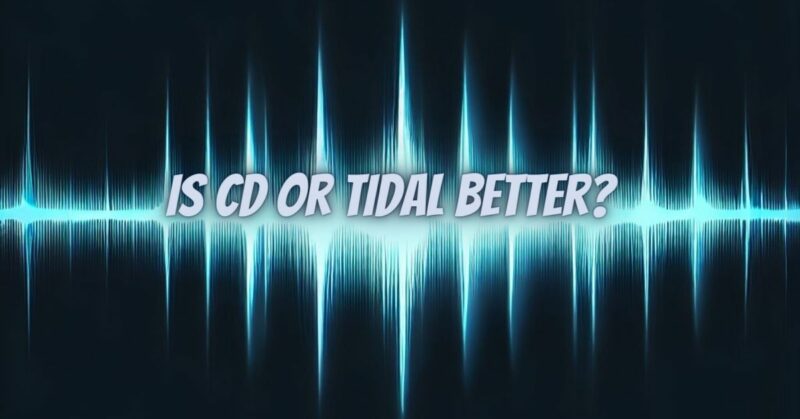In the world of high-fidelity music, two contenders vie for the attention of discerning audiophiles: the venerable Compact Disc (CD) and the digital streaming service Tidal. Both claim to offer exceptional audio quality, but they do so through distinct methods and approaches. In this comprehensive article, we will explore the differences between CD and Tidal, considering factors like sound quality, convenience, versatility, and environmental impact to help you decide which might be the superior choice for your audiophile preferences.
I. Sound Quality
- CDs:
- CDs offer a consistent, known standard of audio quality, often referred to as “CD quality.”
- The audio on a CD is uncompressed and lossless, ensuring that all the original audio data is preserved during playback.
- CDs typically provide a bit depth of 16 bits, a sample rate of 44.1 kHz, and a bitrate of 1,411 kbps.
- Tidal:
- Tidal, particularly its HiFi and Master quality tiers, aims to provide high-quality audio streaming.
- Tidal HiFi streams music at a bitrate of 1,411 kbps, matching CD quality.
- Tidal Master quality offers even higher bitrates (up to 9,216 kbps) and studio-quality sound (24-bit/192 kHz) for an exceptional listening experience.
Verdict: While CDs offer a known standard of audio quality, Tidal HiFi and Master quality tiers closely match CD quality, making them a viable option for audiophiles who prioritize convenience.
II. Convenience and Accessibility
- CDs:
- CDs require physical media and playback equipment, which can be less convenient in the age of digital streaming.
- Collecting and storing CDs can demand significant space.
- Skipping tracks, creating playlists, and accessing music requires manual disc changes.
- Tidal:
- Tidal offers the convenience of streaming music on a variety of devices, from smartphones and tablets to computers and smart speakers.
- The extensive Tidal library allows instant access to a vast array of music without the need for physical discs.
- Tidal’s playlist and discovery features enhance music exploration and curation.
Verdict: Tidal provides greater convenience and accessibility, especially for listeners who value the ability to explore and enjoy music without physical media.
III. Versatility
- CDs:
- CDs are limited to the tracks on the disc, offering a fixed collection of songs.
- To enjoy new music, listeners must purchase or acquire additional CDs.
- Tidal:
- Tidal offers a vast and ever-expanding library of music, allowing users to discover and enjoy new tracks and albums.
- Tidal’s streaming service offers playlists, artist recommendations, and curated content for versatile listening experiences.
Verdict: Tidal excels in versatility, providing access to a broad spectrum of music and enhancing music discovery.
IV. Environmental Impact
- CDs:
- CD production involves the use of physical materials (plastics, metals, and inks) and energy-intensive processes.
- Shipping and storing CDs contribute to carbon emissions.
- Tidal:
- Digital streaming consumes energy for data centers and internet transmission, but the impact is less than physical media production and distribution.
- Tidal has taken steps to reduce its carbon footprint through sustainability initiatives.
Verdict: Tidal’s digital format is generally considered more environmentally friendly than CDs, which involve the production of physical discs and packaging.
V. Cost
- CDs:
- CDs typically require a one-time purchase cost per album or track.
- Over time, amassing a substantial CD collection can be costly.
- Tidal:
- Tidal offers subscription-based pricing, with monthly fees for its HiFi and Master quality tiers.
- Listeners have access to a vast music library for a fixed monthly cost.
Verdict: Tidal’s subscription model can be cost-effective for those who consume a significant amount of music, as it provides access to a vast library for a predictable monthly fee.
The choice between CD and Tidal depends on individual preferences and priorities. While CDs offer a known standard of audio quality and can appeal to collectors and purists, Tidal’s streaming service provides convenience, versatility, and access to high-fidelity audio without the need for physical media. Environmental considerations and cost factors also play a role in the decision-making process.
Ultimately, the decision between CD and Tidal comes down to how you value the various aspects of music consumption. For those who prioritize audio quality and convenience, especially in the digital age, Tidal’s streaming service may prove to be the superior choice. However, for collectors and individuals who relish physical media and value a timeless standard of audio quality, CDs remain a compelling option.


